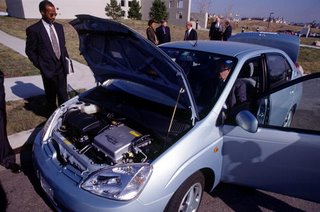Thursday, March 30, 2006

Are high gasoline prices unbalancing your budget? Would you like to learn more about the latest hybrid and alternative fuel vehicles?
Then save Friday, April 7, on your calendar for MATC’s Third Annual GREEN VEHICLES Workshop. This popular workshop will held in room S120 of the Student Services Building on MATC’s downtown Milwaukee campus.
Presentations by experts will acquaint participants with the latest hybrid and alternative-fuel models and technologies. Many of these exciting vehicles will be displayed on the plaza outside the Student Building for your inspection.
Coffee will be served at 8 a.m. in room S114, and presentations will begin at 8:30. MATC President, Dr. Darnell Cole, will welcome participants and introduce our kickoff speaker, Milwaukee Mayor Tom Barrett. Mayor Barrett will expound on the topic “Driving Toward a Greener Milwaukee.”
More information here.



